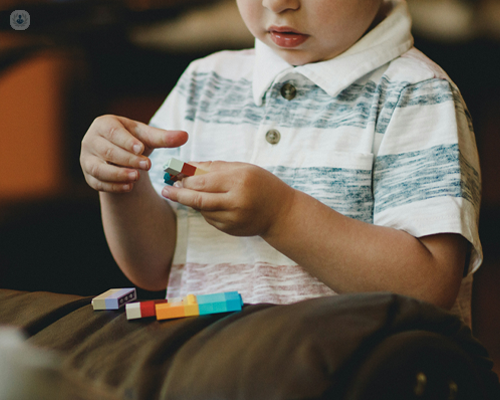Is it ADHD or autism?
Written in association with:Attention deficit hyperactivity disorder (ADHD) and autism spectrum disorder (ASD) are both neurodevelopmental conditions that can exhibit similar symptoms, making it challenging to differentiate between them.
Understanding this is essential in order to make an accurate diagnosis and undertake effective treatment. Leading child and adolescent psychiatrist Dr Colette Solebo provides a detailed insight into this important consideration.

What is ADHD?
ADHD is characterised by persistent patterns of inattention, hyperactivity and impulsivity that interfere with functioning or development. It’s often identified in childhood, although symptoms can continue into adulthood.
What is autism?
Social interaction, communication and behaviour is affected by autism spectrum disorder (ASD). The term ‘spectrum’ reflects the wide range of symptoms and levels of impairment individuals with autism can experience.
What are the main symptoms of ADHD?
ADHD symptoms are generally classified into two main categories: inattention and hyperactivity-impulsivity.
Inattention
- Difficulty maintaining focus on tasks or play activities.
- Frequently makes careless mistakes in schoolwork or other activities.
- When spoken to directly, often appears not to listen.
- Has trouble organising tasks and activities.
- Avoids or is reluctant to engage in tasks requiring sustained mental effort.
- Frequently loses items needed for tasks and activities.
- Easily distracted by external stimuli.
- Often forgetful in daily activities.
Hyperactivity-impulsivity
- Taps hands and feet, fidgets with them or squirms in seat.
- Difficulty remaining seated in situations where staying seated is expected.
- Runs or climbs in inappropriate situations.
- Struggles to play or engage in activities quietly.
- Talks excessively.
- Has difficulty waiting for their turn.
- Interrupts or intrudes on others’ conversations or games.
What are the main symptoms of autism?
Symptoms are typically divided into two categories. These are social communication challenges, and restrictive, repetitive behaviours.
Social communication
- Difficulty with the flow of conversation.
- Reduced sharing of interests, emotions, or affect.
- Trouble understanding and responding to social cues.
- Difficulty forming and maintaining relationships.
- Limited use of eye contact, facial expressions and gestures.
- Restrictive, repetitive behaviours:
- Repetitive movements, use of objects or speech patterns.
- Insistence on sameness and inflexible adherence to routines.
- Intense, focused interests that are unusual in intensity or focus.
- Hyper- or hypo-reactivity to sensory input (e.g., sensitivity to sounds, textures).
How can ADHD and autism be differentiated?
While ADHD and autism share some overlapping symptoms, there are distinct differences:
Social skills
Children with ADHD may have social difficulties due to impulsivity or inattention but generally show an interest in social interaction. In contrast, children with autism often have more profound challenges with social communication and may not seek out social engagement.
Communication
Individuals with autism typically have significant difficulties with both verbal and nonverbal communication, whereas those with ADHD may struggle with communication primarily due to inattention.
Behaviours
Repetitive behaviours and strict routines are more characteristic of autism. Children with ADHD may exhibit impulsive behaviours but are less likely to have repetitive behaviours or strong resistance to change.
Can someone have both ADHD and autism?
Yes, it’s possible for an individual to be diagnosed with both ADHD and autism. These conditions often co-occur, making diagnosis more complex. A comprehensive evaluation by a healthcare professional is essential to distinguish between the two and identify the presence of both.
How are ADHD and autism treated?
ADHD treatment
- Medication: Stimulants (such as methylphenidate) and non-stimulants (such as atomoxetine) can help manage symptoms.
- Behavioural therapy: Aims to modify behaviours, improve organisation, and enhance social skills.
- Educational support: Includes accommodations in school to help with attention and organisation.
Autism treatment
- Behavioural interventions: Applied behaviour analysis (ABA) and other therapies focus on improving social skills, communication and adaptive behaviours.
- Speech and occupational therapy: Addresses communication difficulties and sensory issues.
- Educational support: Specialised programmes and accommodations support learning and development.
Determining whether symptoms are due to ADHD, autism or both is essential for effective management. A thorough evaluation by healthcare professionals ensures appropriate treatment and support. With the right interventions, individuals with ADHD and/or autism can significantly improve their quality of life.
Do you require expert diagnosis for ADHD, autism or both? Arrange a consultation with Dr Solebo via her Top Doctors profile.


